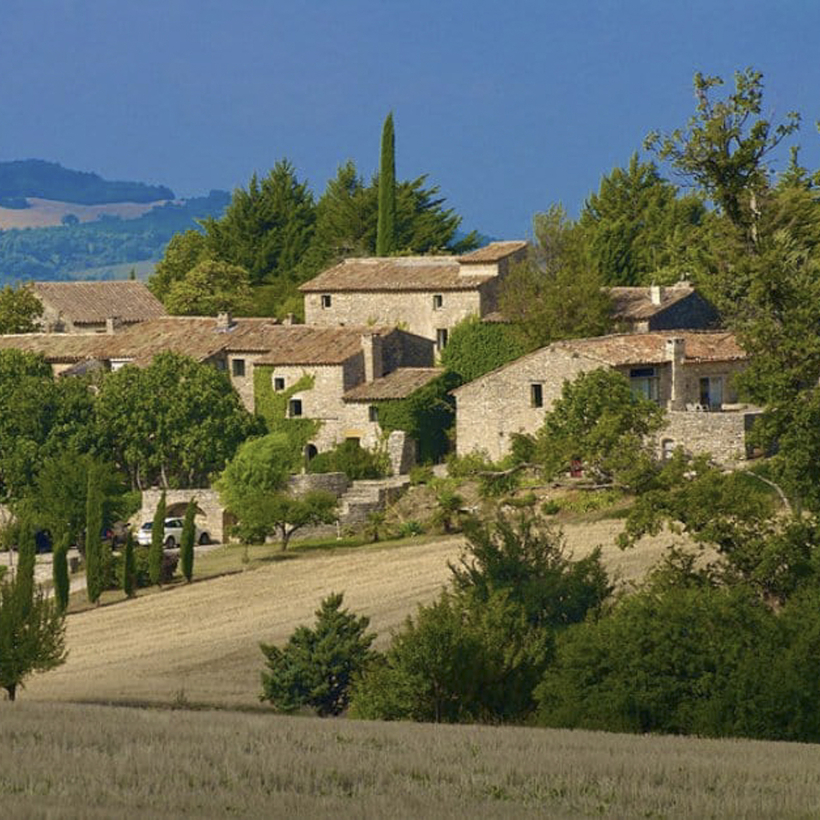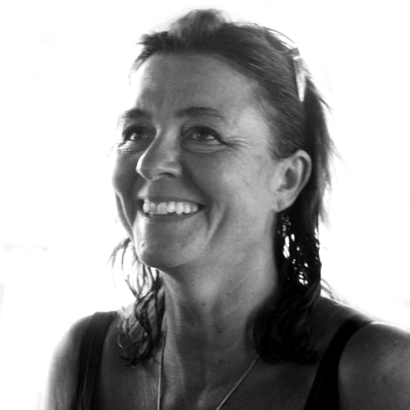An invitation to the medieval, privately owned villa of Le Grand Banc, in the Luberon, promises surprise and drama, and not only because it’s perched 300 feet up on an escarpment of juniper, olive, cypress, and holm oak that feels as vast, remote, and wild as Africa’s Great Rift Valley.
This is not the Provence of popular imagining, not the prettified Peter Mayle version of tidy lavender fields and postcard-perfect towns. Here deep canyons rip through the landscape, vultures glide on the thermal currents, wild boars rustle below and beyond, and the ever present mistral can crescendo from a whisper to a howl, all in the course of a summer’s day.

For the late British inventor and entrepreneur Jeremy Fry, Le Grand Banc and its 400 acres offered all the space, light, and freedom necessary for his creative endeavors. A scion of the J. S. Fry & Sons chocolate dynasty, Fry was a kind of visionary who rescued the Theatre Royal in Bath, galvanized the Northern Ballet company as its patron, and went on to restore and resurrect an entire wooden palace in India, only to have it dismantled and moved to a different state piece by piece.

But Fry’s most lucrative legacy was the engineering company Rotork, which developed an automated valve to improve the flow of gases and fuels. It was an idea he’d dreamed up while living and restoring Le Grand Banc. When he stumbled upon the hamlet, in the 1960s, it was a ruin, abandoned since W.W. II for lack of water. He bought up the cluster of cottages for around $10,000 and went about building a road, installing electricity, and, eventually, renovating eight individual stone houses to create his own private estate.
Then as today, the only sign of civilization was the distant, stern silhouette of the forted hilltop commune of Viens. The search for a source—and the reality of dry summers and drought—were as much part of Fry’s life as they were for Jean de Florette and Manon, the more revered protagonists of Marcel Pagnol’s popular novels, immortalized in film adaptations that were shot locally.

Beginning in the late 60s, it became a lodestar for Fry’s celebrated friends, such as Lord Snowdon, artists Kaffe Fassett and Craigie Aitchison, and entrepreneur James Dyson. Tom Stoppard was a regular visitor, and he reportedly wrote Shakespeare in Love in one of the cool, monastic bedrooms. Robert Carsen workshopped his operas here and helped manage the 400-acre estate.
Many of those who stayed donated the artworks that contribute to the place’s bohemian exuberance. Although Jeremy Fry died in 2005, Le Grand Banc is now managed in the same spirit of energetic hospitality by his younger son, Cosmo Fry, who has also made it available for private rentals and yoga retreats.

Over the years, as a fortunate guest of Cosmo and his wife, Lulu, I have watched our offspring blossom in this unbuttoned and unbridled climate, growing from thumb-sucking toddlers to young adults confident enough to sing, literally, for their supper. This August, the traditional white-dress-code summer party to celebrate the birthdays of Cosmo and his youngest son, Jude, included the requisite sprinkling of beauties (Alexa Chung) among the intellectual heavyweights (John Malkovich and publisher Morgan Entrekin).
Impassioned competition is an integral part of the Le Grand Banc experience, whether it happens around the Ping-Pong table, on the Tour de France route to Mont Ventoux, or in the pétanque alley created beside the new glass-bottle installation by Bruce Munro.

It takes no small level of determination to find the place and reach it, bouncing along the ruts in the dusty country road off any known G.P.S. course. The basic—verging on spartan—bedrooms are tucked into eaves, hidden away at the top of terra-cotta and whitewashed stairwells.
But such simplicity is always an invitation to relax and unwind. In Provence, the sublime is ever concealed in the humble, and we find our taste of heaven in the pile of figs that reach into the palms of our hands, hanging heavy on the boughs that grow in through our bathroom-window frame.
Le Grand Banc is available for rent from $29,000 per weekend; it can accommodate up to 24 guests
Catherine Fairweather is a West Country of England–based writer


